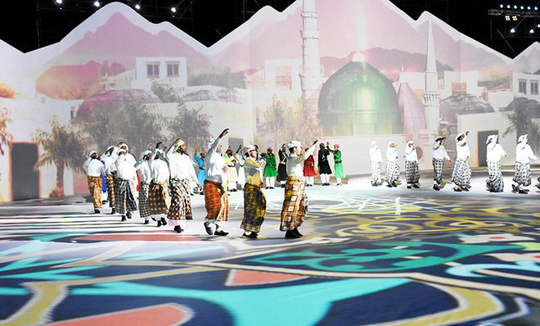Madinah, Feb 27: A theatrical performance to mark Madinah’s status as the 2017 capital of Islamic tourism dazzled crowds in the Saudi city recently.

A large choir, folk dances and actors wearing traditional Arab dress were part of the show for the opening ceremony at the theater in King Fahad Central Park.
It was the product of an experienced director and production team, who were able to offer a special event that will remain engrained in the minds of the audience.
The event included the presentation of five artistic panels. The first spoke about Madinah pre-Islam, and featured a dramatic and musical narrative. The second panel, which featured a large choir, centered on Madinah during the era of the Prophet Muhammad’s (peace be upon him) journey.
The third shed light on the era of the Islamic Caliphate, and included folk dances and songs from the Hijaz region, followed by a performance describing Madinah in the era of the Saudi state. The final performance was a celebration of Muslim and Arab countries in which actors wore national clothing.
According to director Moneer Al-Qahtani, the ceremony employed highly specialized technology and was the largest of its kind in the Kingdom.
More than 250 Saudis from Madinah participated in the event, who were all trained in specialized technological and theatrical services.
Citizens who attended expressed their joy at the performance.
Jaser Ayesh Al-Juhani, who attended the event, described it as “wonderful” and “well organized”, and urged all families in Madinah as well as visitors to attend the associated events, which will continue for a full year.
According to Bandar Al-Juhani, many members of the community have been waiting for such special events in Madinah, adding that he hopes the upcoming events will be just as well executed as the opening ceremony.
Tarek Sultan and Awad Harbi also both expressed their admiration of the event, as well as their pride in seeing Saudi youth participate. “These ceremonies prove the capabilities of Saudi youth who are able to host such large-scale and highly professional events, such as the opening of Madinah as the capital of Islamic tourism,” said Harbi.
Mohammed Hamed Al-Hawairthi also said he hopes to see the organizers continue to host such events and repeat the ceremony performance during the weekends, as many have yet to enjoy it.




Comments
Add new comment